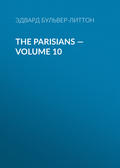
Эдвард Бульвер-Литтон
Tomlinsoniana
BRACHYLOGIA; OR, ESSAYS, CRITICAL, SENTIMENTAL, MORAL, AND ORIGINAL
ADDRESSED TO HIS PUPILS
BY AUGUSTUS TOMLINSON
The irony in the preceding essays is often lost sight of in the present. The illness of this great man, which happened while composing these little gems, made him perhaps more in earnest than when in robust health.—Editor’s Note.
ON THE MORALITY TAUGHT BY THE RICH TO THE POOR
As soon as the urchin pauper can totter out of doors, it is taught to pull off its hat, and pull its hair to the quality. “A good little boy,” says the squire; “there’s a ha’penny for you.” The good little boy glows with pride. That ha’penny instils deep the lesson of humility. Now goes our urchin to school. Then comes the Sunday teaching,—before church, which enjoins the poor to be lowly, and to honour every man better off than themselves. A pound of honour to the squire, and an ounce to the beadle. Then the boy grows up; and the Lord of the Manor instructs him thus: “Be a good boy, Tom, and I’ll befriend you. Tread in the steps of your father; he was an excellent man, and a great loss to the parish; he was a very civil, hard-working, well-behaved creature; knew his station; —mind, and do like him!” So perpetual hard labour and plenty of cringing make the ancestral virtues to be perpetuated to peasants till the day of judgment! Another insidious distillation of morality is conveyed through a general praise of the poor. You hear false friends of the people, who call themselves Liberals and Tories, who have an idea of morals half chivalric, half pastoral, agree in lauding the unfortunate creatures whom they keep at work for them. But mark the virtues the poor are always to be praised for,—industry, honesty, and content. The first virtue is extolled to the skies, because industry gives the rich everything they have; the second, because honesty prevents an iota of the said everything being taken away again; and the third, because content is to hinder these poor devils from ever objecting to a lot so comfortable to the persons who profit by it. This, my pupils, is the morality taught by the rich to the poor!
EMULATION
The great error of emulation is this: we emulate effects without inquiring into causes. When we read of the great actions of a man, we are on fire to perform the same exploits, without endeavouring to ascertain the precise qualities which enabled the man we imitate to commit the actions we admire. Could we discover these, how often might we discover that their origin was a certain temper of body, a certain peculiarity of constitution, and that, wish we for the same success, we should be examining the nature of our bodies rather than sharpening the faculties of our minds,—should use dumbbells, perhaps, instead of books; nay, on the other hand, contract some grievous complaint rather than perfect our moral salubrity. Who should say whether Alexander would have been a hero had his neck been straight; or Boileau a satirist, had he never been pecked by a turkey? It would be pleasant to see you, my beloved pupils, after reading “Quintus Curtius,” twisting each other’s throat; or, fresh from Boileau, hurrying to the poultry-yard in the hope of being mutilated into the performance of a second “Lutrin.”
CAUTION AGAINST THE SCOFFERS OF “HUMBUG.”
My beloved pupils, there is a set of persons in the world, daily increasing, against whom you must be greatly on your guard; there is a fascination about them. They are people who declare themselves vehemently opposed to humbug,—fine, liberal fellows, clear-sighted, yet frank. When these sentiments arise from reflection, well and good,—they are the best sentiments in the world; but many take them up second hand. They are very inviting to the indolence of the mob of gentlemen who see the romance of a noble principle, not its utility. When a man looks at everything through this dwarfing philosophy, everything has a great modicum of humbug. You laugh with him when he derides the humbug in religion, the humbug in politics, the humbug in love, the humbug in the plausibilities of the world; but you may cry, my dear pupils, when he derides what is often the safest of all practically to deride,—the humbug in common honesty! Men are honest from religion, wisdom, prejudice, habit, fear, and stupidity; but the few only are wise; and the persons we speak of deride religion, are beyond prejudice, unawed by habit, too indifferent for fear, and too experienced for stupidity.
POPULAR WRATH AT INDIVIDUAL IMPRUDENCE
You must know, my dear young friends, that while the appearance of magnanimity is very becoming to you, and so forth, it will get you a great deal of ill-will if you attempt to practise it to your own detriment. Your neighbours are so invariably, though perhaps insensibly, actuated by self-interest—self-interest—[Mr. Tomlinson is wrong here; but his ethics were too much narrowed to Utilitarian principles.—EDITOR.]—is so entirely, though every twaddler denies it, the axis of the moral world—that they fly into a rage with him who seems to disregard it. When a man ruins himself, just hear the abuse he receives; his neighbours take it as a personal affront!
DUM DEFLUAT AMNIS
One main reason why men who have been great are disappointed, when they retire to private life, is this: Memory makes a chief source of enjoyment to those who cease eagerly to hope; but the memory of the great recalls only that public life which has disgusted them. Their private life hath slipped insensibly away, leaving faint traces of the sorrow or the joy which found them too busy to heed the simple and quiet impressions of mere domestic vicissitude.
SELF-GLORIFIERS
Providence seems to have done to a certain set of persons—who always view their own things through a magnifying medium, deem their house the best in the world, their gun the truest, their very pointer a miracle—as Colonel Hanger suggested to economists to do; namely, provide their servants each with a pair of large spectacles, so that a lark might appear as big as a fowl, and a twopenny loaf as large as a quartern.
THOUGHT ON FORTUNE
It is often the easiest move that completes the game. Fortune is like the lady whom a lover carried off from all his rivals by putting an additional lace upon his liveries.
WIT AND TRUTH
People may talk about fiction being the source of fancy, and wit being at variance with truth. Now, some of the wittiest things in the world are witty solely from their truth. Truth is the soul of a good saying. “You assert,” observes the Socrates of modern times, “that we have a virtual representation; very well, let us have a virtual taxation too!” Here the wit is in the fidelity of the sequitur. When Columbus broke the egg, where was the wit? In the completeness of conviction in the broken egg.
AUTO-THEOLOGY
Not only every sect but every individual modifies the general attributes of the Deity towards assimilation with his own character: the just man dwells on the justice, the stern upon the wrath; the attributes that do not please the worshipper he insensibly forgets. Wherefore, O my pupils, you will not smile when you read in Barnes that the pygmies declared Jove himself was a pygmy. The pious vanity of man makes him adore his own qualities under the pretence of worshipping those of his God.
GLORIOUS CONSTITUTION
A sentence is sometimes as good as a volume. If a man ask you to give him some idea of the laws of England, the answer is short and easy: In the laws of England there are somewhere about one hundred and fifty laws by which a poor man may be hanged, but not one by which he can obtain justice for nothing!







